 In 1998, the Iowa legislature, capitulating to a well-funded national campaign against gay marriage, amended the state’s marriage statute to define marriage as a union between only a man and a woman.
In 1998, the Iowa legislature, capitulating to a well-funded national campaign against gay marriage, amended the state’s marriage statute to define marriage as a union between only a man and a woman.
Today, in a stunning, courageous, and powerfully written decision, the Iowa Supreme Court unanimously ruled that the state’s anti-gay marriage statute is invalid because it violates the equal protection clause of the state constitution.
The Court’s decision in Varnum v. Brien (2009) is enormously significant not only because it allows same sex couples to marry in Iowa, but also because it so clearly, cogently, and conscientiously dismantles and destroys each and every one of the arguments that the anti-gay forces have made – and continue to make — against sex same marriage.
The Court described the plaintiffs as “six same-sex couples who live in committed relationships. Each maintains a hope of getting married one day, an aspiration shared by many throughout Iowa.” According to the Court, these plaintiffs – “Like all Iowans” – are people who “prize their liberties and live within the borders of this state with the expectation that their rights will be maintained and protected,” but are different from other Iowans in being “sexually and romantically attracted to members of their own sex.” These six couples, the Court observed, “seek to declare the marriage statute unconstitutional so they can obtain the array of benefits of marriage enjoyed by heterosexual couples, protect themselves and their children, and demonstrate to one another and to society their mutual commitment.”
The Court first asserted and defended its right and obligation to rule on the constitutionality of the anti-gay marriage statute. Among the “basic principles essential to our form of government,” the Court explained, is that the state constitution “defines certain individual rights upon which the government may not infringe” including the right to equal protection of the law. Citing the foundational United States Supreme Court case establishing judicial review of the constitutionality of federal statutes — Marbury v. Madison (1803) — the Iowa Supreme Court insisted that its “responsibility to determine if the law enacted by the legislative branch and enforced by the executive branch violates the Iowa Constitution” includes the obligation to “protect the supremacy of the constitution as a means of protecting our republican form of government and our freedoms.”
Certain fundamental rights, including the right to the equal protection of the law, are beyond “the vicissitudes of political controversy” and “beyond the reach of majorities and officials” to limit or deny. Accordingly, the Court has the responsibility “to protect constitutional rights of individuals from legislative enactments that have denied those rights, even when the rights have not yet been broadly accepted, were at one time unimagined, or challenge a deeply ingrained practice or law viewed to be impervious to the passage of time.”
Turning to the equal protection question, the Court first noted that “equal protection can only be defined by the standards of each generation… So, today, this court again faces an important issue that hinges on our definition of equal protection. This issue comes to us with the same importance as our landmark cases of the past. The same-sex-marriage debate waged in this case is part of a strong national dialogue5 centered on fundamental, deep-seated, traditional institution that has excluded, by state action, a particular class of Iowans. This class of people asks a simple and direct question: How can a state premised on the constitutional principle equal protection justify exclusion of a class of Iowans from civil marriage?”
The proper equal protection question is not, according to the Court, whether the classifications made by the law are applied equally; instead the law itself must be equal: “In other words, to truly ensure equality before the law, the equal protection guarantee requires that laws treat all those who are similarly situated with respect to the purposes of the law alike.”
The Court noted that “courts apply a heightened level of scrutiny under equal protection analysis when reasons exist to suspect ‘prejudice against discrete and insular minorities . . . which tends seriously to curtail the operation of those political processes ordinarily to be relied upon to protect minorities.” Looking at the history of discrimination and prejudice against gay and lesbian people, the irrelevancy of sexual orientation to an individual’s ability to contribute to society, the immutability of an individual’s sexual orientation, and the historical political powerless of gays and lesbians, the Court determined that a “heightened scrutiny” standard should be applied to gauge the impact of the anti-gay marriage statute on same sex couples.
Nevertheless, the Court found that the anti-gay marriage statute did not pass constitutional muster even under an “intermediate scrutiny” standard because it is not “substantially related to an important governmental objective.”
The Court first emphatically rejected the claims that permitting same sex couples would undermine the institution of marriage or would harm the state’s children.
While noting the “superficial appeal” of the argument that same-sex marriage ban promotes the ‘integrity of traditional marriage’ by ‘maintaining the historical and traditional marriage norm [as] one between a man and a woman,” the Court found this claim to be circular: “When a certain tradition is used as both the governmental objective and the classification to further that objective, the equal protection analysis is transformed into the circular question of whether the classification accomplishes the governmental objective, which objective is to maintain the classification. In other words, the equal protection clause is converted into a ‘barren form of words’ when ‘discrimination . . . is made an end in itself’.”
The Court next unequivocally held that “scientific research has repudiated the commonly assumed notion that children need opposite-sex parents or biological parents to grow into well-adjusted adults.” The Court also found that, in regard to protecting children, the anti-gay marriage is both under and over-inclusive: “The civil marriage statute is under-inclusive because it does not exclude from marriage other groups of parents—such as child abusers, sexual predators, parents neglecting to provide child support, and violent felons—that are undeniably less than optimal parents. Such under-inclusion tends to demonstrate that the sexual-orientation-based classification is grounded in prejudice or “overbroad generalizations about the different talents, capacities, or preferences” of gay and lesbian people, rather than having a substantial relationship to some important objective. … The ban on same-sex marriage is substantially over-inclusive because not all same-sex couples choose to raise children.”
The Court also found that “If the statute was truly about the best interest of children, some benefit to children derived from the ban on same-sex civil marriages would be observable. Yet, the germane analysis does not show how the best interests of children of gay and lesbian parents, who are denied an environment supported by the benefits of marriage under the statute, are served by the ban. Likewise, the exclusion of gays and lesbians from marriage does not benefit the interests of those children of heterosexual parents, who are able to enjoy the environment supported by marriage with or without the inclusion of same-sex couples.”
The Court next rejected the claim that prohibiting same sex couples from marrying would advance the legitimate governmental objective of promoting procreation: “the sole conceivable avenue by which exclusion of gay and lesbian people from civil marriage could promote more procreation is if the unavailability of civil marriage for same-sex partners caused homosexual individuals to ‘become’ heterosexual in order to procreate within the present traditional institution of civil marriage. The briefs, the record, our research, and common sense do not suggest such an outcome. Even if possibly true, the link between exclusion of gay and lesbian people from marriage and increased procreation is far too tenuous to withstand heightened scrutiny. Specifically, the statute is significantly under-inclusive with respect to the objective of increasing procreation because it does not include a variety of groups that do not procreate for reasons such as age, physical disability, or choice. In other words, the classification is not substantially related to the asserted legislative purpose.”
The Court also rejected the claims that prohibiting same sex marriage promoted stability in opposite-sex relationships — “While the institution of civil marriage likely encourages stability in opposite-sex relationships, we must evaluate whether excluding gay and lesbian people from civil marriage encourages stability in opposite sex relationships. The County offers no reasons that it does, and we can find none. The stability of opposite-sex relationships is an important governmental interest, but the exclusion of same-sex couples from marriage is not substantially related to that objective” – and that prohibiting same sex marriage would conserve state resources – “Excluding any group from civil marriage — African-Americans, illegitimates, aliens, even red-haired individuals—would conserve state resources in an equally “rational” way. Yet, such classifications so obviously offend our society’s collective sense of equality that courts have not hesitated to provide added protections against such inequalities.”
Based on these findings, the Court concluded that none of the purported objectives of the ban on same sex marriage “were furthered in a substantial way by the exclusion of same-sex couples from civil marriage.”
Strikingly, and courageously, the Court then addressed the real basis for the same sex marriage ban – religious opposition to homosexuality: “While unexpressed, religious sentiment most likely motivates many, if not most, opponents of same-sex civil marriage and perhaps even shapes the views of those people who may accept gay and lesbian unions but find the notion of same-sex marriage unsettling… Whether expressly or impliedly, much of society rejects same-sex marriage due to sincere, deeply ingrained — even fundamental — religious belief. Yet, such views are not the only religious views of marriage… other equally sincere groups and people in Iowa and around the nation have strong religious views that yield the opposite conclusion… Our constitution does not permit any branch of government to resolve these types of religious debates and entrusts to courts the task of ensuring government avoids them… civil marriage must be judged under our constitutional standards of equal protection and not under religious doctrines or the religious views of individuals. This approach does not disrespect or denigrate the religious views of many Iowans who may strongly believe in marriage as a dual-gender union, but considers, as we must, only the constitutional rights of all people, as expressed by the promise of equal protection for all. We are not permitted to do less and would damage our constitution immeasurably by trying to do more.”
The Iowa decision can not be as readily overturned as the California Supreme Court’s similar decision in the Marriage Cases was overturned by Prop 8.
Unlike California, where the state constitution can almost immediately be amended by a simple majority vote in a ballot measure, the Iowa constitution can be amended only when majorities in both the state House and Senate in two consecutive general assemblies approve an amendment, and then the amendment is approved by a majority of voters in the next general election. Since each general assembly lasts for two years, the earliest that a proposed amendment overturning the Court’s decision could reach voters is November 2012.
It is also notable that in reaching its conclusions, the Iowa Supreme Court extensively cited and relied on the California Supreme Court decision in the Marriage Cases.
Let us hope that the California Supreme Court, which is now considering whether Prop 8 can take away the fundamental right of gay and lesbian people to marry, carefully reads the Iowa decision.
 When accessing the political apologetics of evangelicals, it is tempting to deal with them on their own terms and question whether their contrition is perfect and sincere enough to remove the stain that their sins have placed on their souls.
When accessing the political apologetics of evangelicals, it is tempting to deal with them on their own terms and question whether their contrition is perfect and sincere enough to remove the stain that their sins have placed on their souls.
 In 1998, the Iowa legislature, capitulating to a well-funded national campaign against gay marriage, amended the state’s marriage statute to define marriage as a union between only a man and a woman.
In 1998, the Iowa legislature, capitulating to a well-funded national campaign against gay marriage, amended the state’s marriage statute to define marriage as a union between only a man and a woman.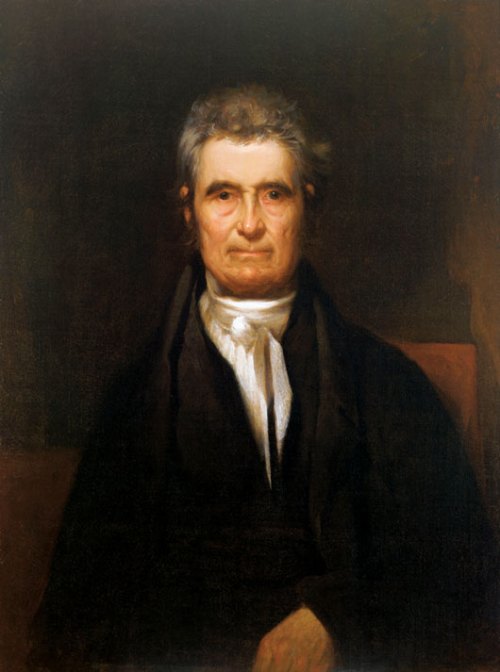
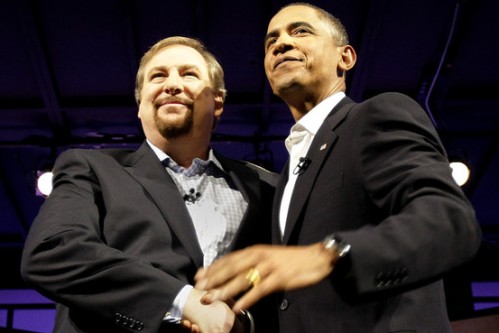
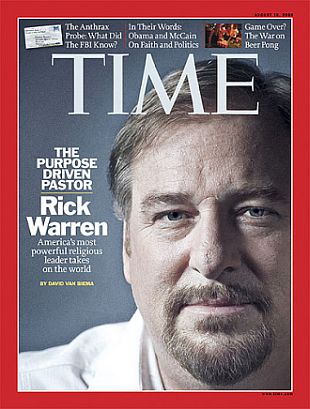
 When I wrote a blog post on the
When I wrote a blog post on the 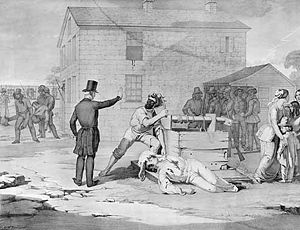
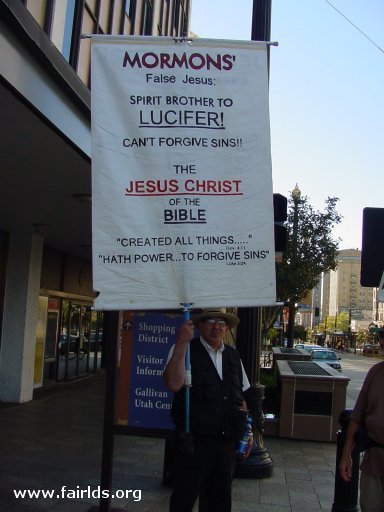

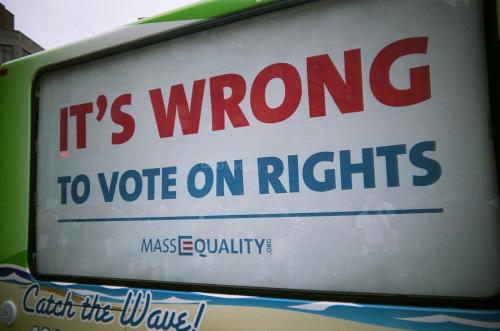 The most recent election results show that voters appear to have have endorsed California’s Proposition 8 — changing the state Constitution to require that “Only marriage between a man and a woman is valid or recognized in California” — by 5,376,424 (52%) to 4,870,010 (48%) with 99% of the precincts reporting.
The most recent election results show that voters appear to have have endorsed California’s Proposition 8 — changing the state Constitution to require that “Only marriage between a man and a woman is valid or recognized in California” — by 5,376,424 (52%) to 4,870,010 (48%) with 99% of the precincts reporting.
You must be logged in to post a comment.